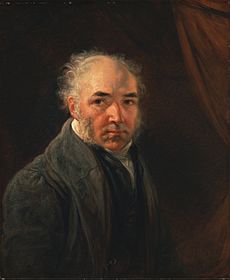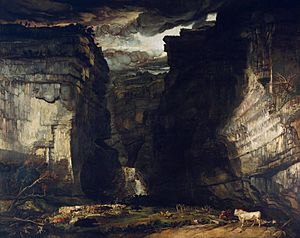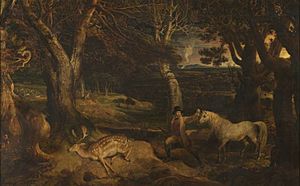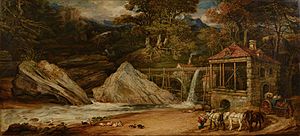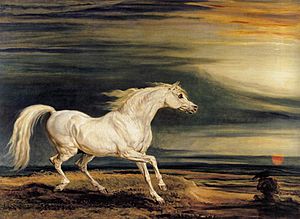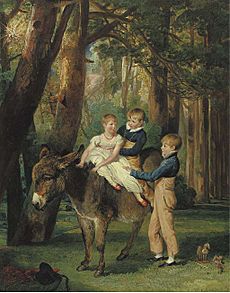James Ward (English artist) facts for kids
Quick facts for kids
James Ward
|
|
|---|---|
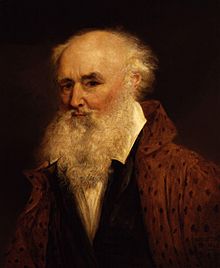
Self-portrait, 1848
|
|
| Born | 23 October 1769 |
| Died | 17 November 1859 (aged 90) Cheshunt, Hertfordshire, England
|
| Nationality | English |
| Known for | Painting, Engraving |
| Movement | Landscapes, Romanticism |
| Spouse(s) |
Mary Ann Ward
(m. 1794)Charlotte Fritche
(m. 1827) |
| Awards | Royal Academician (R.A.) |
| Influenced by | George Morland, Rubens |
James Ward RA (born October 23, 1769 – died November 17, 1859) was a famous English painter and engraver. He was especially known for his amazing paintings of animals.
About James Ward
James Ward was born in London. His older brother, William Ward, was also a talented engraver. James learned a lot from his brother.
His art career can be split into two main parts. Early on, he was greatly inspired by his brother-in-law, George Morland. Later, after 1803, he was influenced by the famous artist Peter Paul Rubens.
Around 1810, James Ward started focusing on painting horses in beautiful landscapes. A bit later, he began creating very large landscape paintings. One of his most famous works is Gordale Scar, finished around 1814 or 1815. This painting shows a dramatic place in Yorkshire, England. It's a great example of English Romanticism in art, which focused on strong emotions and the power of nature.
From 1815 to 1821, Ward spent a lot of time on a huge painting called Allegory of Waterloo. Sadly, this painting is now lost. It didn't get much praise and didn't earn him the money he hoped for. This experience, along with losing his first wife and a daughter, was very tough for him.
Like many artists of his time, Ward often painted for rich families. They would ask him to paint their favorite horses, hunting dogs, or even their children. The Levett family was one such group. Ward painted them many times and became good friends with them. Some of his well-known portraits include Theophilus Levett hunting at Wychnor, Staffordshire (1817) and The Reverend Thomas Levett and his favourite dogs, cock-shooting (1811). He also painted a group portrait of three Levett children: John, Theophilus, and Frances.
His Family Life
James Ward married Mary Ann Ward (who was not related to him) in 1794. After she passed away, he married Charlotte Fritche in 1827. She was thought to be a relative of his first wife.
James and Mary Ann Ward had several children, including:
- Matilda Louisa Ward, who married an artist named John Jackson.
- George Raphael Ward, born in 1798 and died in 1879.
James Ward was also the grandfather of the painter Henrietta Ward. His great-grandson was Leslie Ward, a famous caricaturist for Vanity Fair magazine.
In 1830, Ward moved to Cheshunt in Hertfordshire with his second wife. He continued to paint, especially focusing on religious themes. In 1855, he had a stroke, which meant he could no longer work. He passed away in 1859 and is buried at Kensal Green Cemetery.
What Kind of Art Did He Make?
James Ward was one of the most talented artists of his time. His unique style and great skill made him stand out. He had a big impact on British art. He was known as one of the best animal painters, but he also created history paintings, portraits, landscapes, and everyday scenes.
He started his career as an engraver, learning from his brother William. Together, William and James Ward created some of the best English art. Their amazing skill and artistry led to beautiful images that showed the grace and charm of their era. James Ward became a member of the Royal Academy in 1811.
One of Ward's most famous paintings is The Deer Stealer. He was asked to paint it in 1823 by his friend Theophilus Levett. Levett loved the painting so much that he paid Ward extra money for it! Ward was even offered more money for the painting by a nobleman, but he said no. This painting can now be seen at the Tate museum in London.
See also
- List of British artists
 | Tommie Smith |
 | Simone Manuel |
 | Shani Davis |
 | Simone Biles |
 | Alice Coachman |


